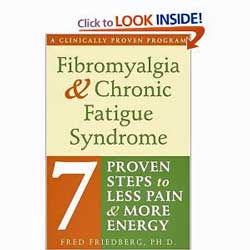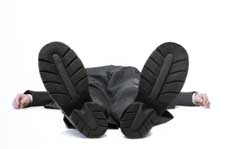 (Dr. Friedberg is an intriguing figure; a psychologist questions the effectiveness of CBT and who, as President of the IACFS/ME, has taken the CDC to task for beginning CBT trials yet someone who is also believes that pacing and ‘stress management’ can pay real dividends for some people with ME/CFS.
(Dr. Friedberg is an intriguing figure; a psychologist questions the effectiveness of CBT and who, as President of the IACFS/ME, has taken the CDC to task for beginning CBT trials yet someone who is also believes that pacing and ‘stress management’ can pay real dividends for some people with ME/CFS.
In this long interview he talks about the differences he sees between people with ME/CFS and FM, men and women with ME/CFS, the importance, in the absence of a cure of accepting ‘half a loaf and creating joy and pleasure, how improved health does not necessarily result in increased activity, why the cognitive in CBT may be over-emphasized, what he has done as a person with CFS that has helped and more.
 I interviewed him some time after his book ‘Seven Steps to Less Pain and More Energy‘ came out. Recently I realized, that I ‘d never published the second half of this interview-which was easily the most interesting part, so here is the interview, for the first time, in full. Please note it was done pre-XMRV. )
I interviewed him some time after his book ‘Seven Steps to Less Pain and More Energy‘ came out. Recently I realized, that I ‘d never published the second half of this interview-which was easily the most interesting part, so here is the interview, for the first time, in full. Please note it was done pre-XMRV. )
Dr. Friedberg is not your typical psychologist; a clinician, researcher, author and former IACFS/ME board member and now President, he’s also had chronic fatigue syndrome (ME/CFS) for over twenty years. For much of that time he did what most people with this disease do; he spent alot of time and money trying every treatment he could. About five years he stopped trying to overcome the disease and began to focus on how he could interact skillfully with it – how he could manage it – and as he did that it lessened it’s grip on him. His book below relays the insights he gained during that process.
His Story
You’ve had ME/CFS for over twenty years. You’ve tried many different therapies and seen many different practitioners and even moved twice in order to get into cleaner environments. Your book, on the other hand, focuses on relatively simple (if not easy) things ME/CFS patients can do themselves to improve their health. How much improvement did you get by the first versus the second approach?
To my surprise, moving to a different, presumably cleaner environment (rural, so less auto exhaust, I reasoned) did not help at all. Actually, my condition worsened. The second approach (on which my book is based) involved doing more pleasurable, but less exhausting things and getting more socially connected. These new involvements have helped considerably. I’d say I’m 40-50% improved, but I still cannot do the regular exercise (running) that I loved to do. Instead, I play volleyball, which lessens my fatigue and makes me feel better physically and emotionally –- and the improved feeling is sustained over long periods. Part of the benefit comes from the sense of camaraderie and excitement I get from the team I play on. Perhaps because it’s an anaerobic activity, I don’t get symptom flares from playing the game.
After you got chronic fatigue syndrome (ME/CFS) you slowly (18 years!) figured out that lifestyle imbalances that were really affecting your health. They didn’t before – prior to getting this disease you were able to tolerate a less than optimum lifestyle without consequences for your health. For instance, your tendency to overwork and isolate yourself didn’t stop you from going on your long distance runs. For you relaxation/meditation efforts, increased social contacts, seeking out more pleasurable activities has really helped. For someone who’s a ‘social butterfly’ I assume different changes would be helpful. Is the ‘recipe’ for lifestyle rebalancing going to change much from person to person?
Yes, what constitutes lifestyle balance depends on the individual. In general, incorporating more low effort pleasant activities and more emotional support as well as fewer high stress, high effort activities moves lifestyle toward balance. But what activities are pleasant and what is high stress is defined by the individual. And yes, my life was out of balance for some time before I became ill.
A Lifestyle Balance Program
Your approach, which you call a ‘lifestyle balance program’ suggests many ME/CFS patients lifestyles are out of balance; that is given their disease, they have an inappropriate lifestyle. What do you mean by this?
People with ME/CFS, before they became ill, and even afterward, have led high-activity and high  stress lifestyles. This may include full-time work, family responsibilities, regular exercise, volunteer work, and too little sleep. And usually people take little time for themselves. So your life is out of balance in that you almost exclusively focus on being productive and caretaking of others. I call this “helping and hard driving.” Although you may find satisfaction in being so active (and receive admiration from others) you may also feel stressed and pressured to continue this treadmill existence.
stress lifestyles. This may include full-time work, family responsibilities, regular exercise, volunteer work, and too little sleep. And usually people take little time for themselves. So your life is out of balance in that you almost exclusively focus on being productive and caretaking of others. I call this “helping and hard driving.” Although you may find satisfaction in being so active (and receive admiration from others) you may also feel stressed and pressured to continue this treadmill existence.
This high activity, high stress lifestyle in combination with other vulnerability factors (e.g., genetics, immune defects, stress hormone depletion, past trauma) leads to a collapse into illness. Bodily signals of stress and exhaustion which have been ignored now trigger collapse. Of course, there may be more obvious triggers, such as a car accident, a serious flu, a change in medication, or any stressful major life change.
Once ill, many individuals may stay relatively active, but others may become disabled and homebound. So, the unbalanced life can go in both directions – continuing to do too much or doing too little. Even within an individual—push – crash cycles can lead to a pattern of both doing too much or doing too little. The idea is to find a healthy balance between these two extremes.
Accepting ‘Half a Loaf’
Your book doesn’t promise a cure; it promises seven proven steps to ‘less pain’ and ‘more energy’. My gut response when I look at a technique that promises benefits but not necessarily a cure is that a) the benefits are probably small and b) that what I really want is to be completely healthy so I’ll keep looking for ‘the cure’. You suggest, though, this is probably not a profitable way to approach ME/CFS?
Yes, Cort, I think you’re right on track with the reactions I sometimes get about the book. I was looking for a CFS cure for 18 years. Nothing less than total health was acceptable! My search for cures led me down the path of alternative remedies of all kinds. The result: little illness change and a depleted bank account. I completely understand the desire to be restored to full health. But we just don’t have the means right now, medical or otherwise, to get there.
So I ask people if they’re willing to accept half a loaf, if full recovery is not possible now. I think the more flexible you are about how well you need to be, the greater the chances of finding a path to improvement—through your own personal efforts.
While it doesn’t promise a cure your book is not about cleaning up around the edges either. The goal of this ‘self-help’ manual for chronic fatigue syndrome (ME/CFS) and fibromyalgia is to use lifestyle adjustments and these seven stress reduction techniques to substantially improve one’s health. How far can ME/CFS patients go using these techniques? Can they become well?
This is another critical point. You can definitely improve with lifestyle change, not just cope in a defensive way with unpredictable fluctuations in your illness. I think it is possible to approach near-recovery or wellness by arranging your life so that you allow yourself the time for adequate rest, relaxation and sleep, positive low effort experiences, full expression of emotions, and good social support. Almost anyone who follows these lifestyle guidelines can improve noticeably and sometimes very substantially.
‘Active Extended Relaxation Strategies’
You’re a strong advocate of using what you call ‘active, extended relaxation strategies’ such as meditation, focused breathing, progressive muscle relaxation, etc. and they’re the first step you cover in your book. Are these things any person with a chronic illness benefit from or are they particularly beneficial for ME/CFS/FM patients and if so, why?
The first prescription I give is for home relaxation using a relaxation CD. Many people who I see with ME/CFS are extremely stressed due to frustration over illness limitations. A sudden onset of any poorly understood debilitating condition may trigger strong emotional reactions. Relaxation will ease that stress and generate pleasant feelings. In some cases, perhaps 1 out of 10, relaxation will produce significant illness improvements. On the other hand, some people will not find relaxation beneficial because they are not overly stressed or they just don’t care to do the techniques.
 Your benefits from doing relaxation/meditation exercises increased dramatically when you began doing them far longer than most people would think to do. At one time I believe you were doing several hours of these exercises a day. This seemed to get you over the hump so to speak and after a time you could attain the same effects by doing much lower levels. What happened here do you think? Were you kind of retraining your central nervous system to calm down? To operate at a slower, less frenetic pace? To burn up less energy?
Your benefits from doing relaxation/meditation exercises increased dramatically when you began doing them far longer than most people would think to do. At one time I believe you were doing several hours of these exercises a day. This seemed to get you over the hump so to speak and after a time you could attain the same effects by doing much lower levels. What happened here do you think? Were you kind of retraining your central nervous system to calm down? To operate at a slower, less frenetic pace? To burn up less energy?
I did the meditation twice a day, 20 minutes each time. Sometimes I increased it to an hour a day. I once went on a meditation weekend and did 2 hours a day. After that, I felt buffered from stress for about a month. The meditation caused me to react much less to any problem or stress. For instance, I might think angry thoughts, but I only felt slightly angry. Prior to the meditation, I would feel like a pressure cooker when I was angry.
Your program is the opposite of the pop a pill approach that permeates medicine. It takes some time and discipline to get the full benefit. For instance, it appears that the more you put into these ‘extended’ relaxation strategies the more you get out of them. You noted that an author of a fibromyalgia stress reduction/meditation study stated ‘it is only the people that use this technique regularly who show a decrease in the stress response’. How much time does the average ME/CFS/FM patient need to devote to these practices daily to show a significant benefit?
You can see benefits after a single 15 minute relaxation session. But to sustain these benefits requires some level of regular practice over several weeks time. Twice a day is ideal. But once you learn to associate a relaxation technique – say even 20 seconds of focused breathing — with tension release, then you can use it almost anywhere to dampen stress and generate good feelings. I practiced meditation regularly for 15 years—and I have what you might call a near-permanent state of relaxation. I rarely feel upset or stressed the way I used to be.
Can researchers point to physiological changes occurring in the body as a result of these practices?
Yes. There is a fairly substantial scientific literature on the benefits of relaxation, including improvements in immune function and stress hormones. Both of these physiological processes are implicated in ME/CFS.
Sleep and Pain
Physicians often say that getting good sleep is critical to a chronic fatigue syndrome (ME/CFS) patient’s recovery. Given that it’s not surprising that many patients at some point turn to and benefit from prescription drugs. You spoke of one patient, though, who found that a combination of a relaxation tape and a progressive muscular relaxation exercise was more useful than drugs in helping her obtain consistently good sleep. Can these types of exercises reduce prescription drug usage or even take their place for a significant number of ME/CFS patients?
The short answer is “Yes.” Deep relaxation before bed programs the body for more restorative, restful sleep. Of course, it’s easier to take a pill (assuming it works), but if you want to self-manage your  sleep without medications, it can be done. Relaxation can reduce your need for sleeping pills and it will counteract that “tired and wired” feeling that many people have at night before going to sleep. And if formal relaxation doesn’t suit you, any personally relaxing activity may work just as well. This could be listening to soft music, pleasure reading, etc. If it leads to a sense of deep calm, you get the sleep benefit.
sleep without medications, it can be done. Relaxation can reduce your need for sleeping pills and it will counteract that “tired and wired” feeling that many people have at night before going to sleep. And if formal relaxation doesn’t suit you, any personally relaxing activity may work just as well. This could be listening to soft music, pleasure reading, etc. If it leads to a sense of deep calm, you get the sleep benefit.
You also told a similar story of someone who was able to reduce her pain medication and became more pain free rather quickly after starting muscle relaxation exercises. Again, is this a pattern you see often? Is the ME/CFS/FM population as a whole missing some effective, healthy and cheap ways to reduce their pain?
Relaxation can reduce pain in ME/CFS/FM if practiced regularly. And that may be all that some people need. But often, the pain is anchored, at least in part, in an individual’s emotional life and that must be addressed as well. Strong, but unexpressed emotions are a big contributor to the type of widespread pain you see in FM. People with FM may be angry at themselves for failing to live up to their own high standards. Also they may be angry at unsupportive family and others—given all that the ill person has done to provide for and help those close to them. But the individual may be unable to identify or express that anger and so it festers internally, creating physiological changes that produce pain.
Learning how to express that anger constructively and ask for what you want (and not doing what you don’t want to) is a first important step in managing your life more effectively and reducing persistent pain.
The ‘Wired But Tired’ Problem :cheshire:
Your discussion of ‘longstanding hyperactive patterns’ in chronic fatigue syndrome (ME/CFS) really rang a chord for me. It seems bizarre that someone with a fatiguing disease could exhibit ‘hyperactivity’ but that is my experience. When I walk I tend to walk fast, when I eat I eat fast, and my mind is often racing. Some studies do suggest ME/CFS patients are stuck in a chronic ‘fight or flight’ stress response. Can calming the mind calm the body down too? Is it possible to turn off this chatter and reduce this underlying nervous tension?
A high activity pattern is very common in ME/CFS. I think that allowing yourself to have personally enjoyable downtime is one way to infuse a little more balance in your life. The balance you’re looking for is between activity, rest and leisure. Once the rest and leisure parts are worked into your schedule, then the active go-go part of your personality and all that positive excitement that goes with it can be better maintained.
Also, it’s good to allow at least some time to wind down the internal chatter by distracting yourself in some positive way — so that your not forcing yourself into a new pattern — but just easing into other things that you may not have normally done or thought about.
Do you think this mental wiredness or nervous tension is a core part of the disease itself or is it more an inevitable buildup of the all the frustrations and problems the disease brings with it? Do patients with other chronic diseases display this kind of pattern or is this something you find more in ME/CFS and FM?
The tired and wired feeling that people have especially at night before they go to bed is typical of insomniacs—poor sleepers who may or may not be medically ill. There’s an interesting theory of CFS/FM that views a broken up sleep pattern as a primary cause of these illnesses. A study was done by Dr. Harvey Moldofsky about 30 years ago in Toronto where healthy individuals spent 3 nights in a sleep lab. During their deep stage of sleep a low level noise was played that disrupted sleep but did not wake them up. After 3 nights of this, these subjects developed widespread pain similar to FM. And this study had been replicated.
In CFS and FM, we also may find a type of disrupted deep sleep called “alpha-delta intrusion.” So unrestful sleep may play a role in causing pain as it does in fatigue. Improving sleep may help to lessen pain as well as fatigue.
The Push-Crash Cycle and Pacing
You say if you agree with this statement “I do much more when I feel better and much less when I feel worse” you’re engaged in a negative pattern. But this seems like chronic fatigue syndrome (ME/CFS) to me! This is how I operate. What’s wrong with this?
The up and down pattern is certainly the way things usually are for people with ME/CFS. And I don’t think that lifestyle changes can completely eliminate this pattern. There are certain things you want to do that you know will lead to a crash (say a concert you want to attend). But you do them anyway because it’s important enough to you that it’s worth the consequence. Nothing wrong with that.
What I suggest to people is that they try to be more consistent in their daily activities—so they may do only a bit more on a good day and just a bit less on a bad day. What I often see are up  and down patterns where if the energy is there, the individual runs out the clock on that energy by doing all of the things that have been left undone until he/she totally collapses—and stays that way for some time. This pattern doesn’t give the body a chance to recharge. With gradual, rather than sudden increases in activity, a daily routine can be developed and energy level can slowly increase because it is not used up all at once.
and down patterns where if the energy is there, the individual runs out the clock on that energy by doing all of the things that have been left undone until he/she totally collapses—and stays that way for some time. This pattern doesn’t give the body a chance to recharge. With gradual, rather than sudden increases in activity, a daily routine can be developed and energy level can slowly increase because it is not used up all at once.
You believe that ‘pacing’ or finding and living within your ‘energy envelope’ can really pay off. What is the theory behind ‘pacing’ or slowly enlarging one’s ‘energy envelope’? Say you’re a 4 on the pain/fatigue scale how far can rigorous pacing get you with 10 being perfectly healthy? Is your typical ME/CFS patient doing too much or too little?
Most people with the illness are still doing too much, although less than when they were well. By doing too much, I mean that they are in constant exhaustion states doing things they must do (e.g., job, family obligation) and possibly adding in activities like occasional vigorous exercise. One person told me that if she didn’t have her job and family responsibilities to keep her going, she would just sleep. On the other hand, perhaps 1 in 4 people are doing too little and may be homebound and on disability. “Too little” means that they have the potential to do more in a measured way, but they feel unable to break out of their low activity patterns. I will say that even when you feel locked into your schedule, there are ways to modify it and feel more in control of your symptoms.
Thoughts and Energy
You state that negative thought patterns which sort of insinuate themselves into ME/CFS patients minds can deplete their energy and impair their well-being. As an example you give the thought “I’m so sick!”. This thought, though, seems like a normal outcome to situations ME/CFS patient’s often find themselves in; every time they overdo it seems like the reaction “I’m so sick!” would naturally pop up. How does a thought like this cause problems over time?
A thought like “I’m so sick!” generates feelings of discouragement, demoralization, and a sense of physical malaise. That malaise will almost imperceptibly meld into your illness experience so that you feel more ill. You may think that your illness feelings are only illness-based, but that additional malaise does a good job of mimicking the illness experience so that you feel more sick. If the discouragement is almost always there, then it’s helpful to distract yourself into pleasant thoughts and activities as much as possible. When you do this, you will see the change in your illness experience—which becomes more of a background factor.
I think it would be extraordinary if some negative thoughts/behavior patterns did not insinuate themselves over time into most ME/CFS patients given what they have to deal with. You propose combating these negative thought patterns simply by repeating a preformatted response for five minutes a day. For guilt you suggest something like ‘I will do what I can reasonably do and I will value this achievement rather than condemning myself for what cannot be done’. What does this do?
If an individual has a pervasive sense of guilt, especially true in FM, it is usually linked to self-condemning thoughts, such as “I’m no good, unworthy, inadequate, or not a nice person.” If these thoughts are challenged (even for a few minutes a day) with logical coping statements as you’ve stated, the guilt-producing thoughts will lose their power to upset and stress the individual. When stressful emotions are purged, quality of life improves and the burdens of being ill are eased. That said, not everyone who is ill has intense ongoing negative emotions, so coping on this level is best recommended for those who have this kind of stress.
This brings up the question of how different ME/CFS and FM patients are? As a clinical psychologist do you see different kinds of problems/traits in these two disorders?
In FM, I see more suppressed anger. With ME/CFS, the anger is verbalized more easily. Also, in FM, the caretaking, people pleasing behaviors, and the level of self-sacrifice seems to be greater.
A lot of the advice in your book is contrary to the behavioral patterns we grow up with. Healthy people don’t ordinarily look for negative thought patterns, nor do they check if they’re being ‘hyperactive’., nor do they keep activity logs, etc. It seems like you’re proposing that ME/CFS patients develop a kind of attention to what they’re doing, how they’re thinking and how they’re interacting that most healthy people wouldn’t even dream of doing. Why is this kind of care needed in ME/CFS?
Actually, if you look at medical care today, a fair amount of it is oriented toward self-care and self-management of problems at home, even for people who are ostensibly healthy. Things such as high cholesterol, metabolic syndrome, poor diet, stress, and sedentary lifestyle are all risk factors for illness. The doctor or other health professional may recommend a daily diary to identify unhealthy patterns so that corrective action can be taken. Of course, no one gets excited about doing self-monitoring, but it is an important part of staying healthy or managing illness. Also, note that 40% of the population has a chronic condition, so total health is not the norm for many people.
 Paying close attention to your daily patterns is important in ME/CFS but it is hardly a fun activity. Perhaps the implication of your question is that it seems kind of unfair that you have to be inconvenienced with all this extra attention to what you do. When others just go about their business without pondering whether they should or should not do something due to fatigue problems. Good CFS management seems to require some level of attention to what you do. I think this is a healthy corrective for many people who may have ignored bodily signals of exhaustion before they became ill.
Paying close attention to your daily patterns is important in ME/CFS but it is hardly a fun activity. Perhaps the implication of your question is that it seems kind of unfair that you have to be inconvenienced with all this extra attention to what you do. When others just go about their business without pondering whether they should or should not do something due to fatigue problems. Good CFS management seems to require some level of attention to what you do. I think this is a healthy corrective for many people who may have ignored bodily signals of exhaustion before they became ill.
Gathering evidence suggests that the stress response systems are impacted in ME/CFS and FM. This would imply that people with these kinds of diseases are impacted more by stressors of every kind; physical, mental and emotional than healthy people. If that’s true then it would seem logical that giving attention to activity patterns, negative thoughts, sleep hygiene – would make sense in this type of disease?
Yes, people with these illnesses are often broadly sensitive to all kinds or stressors—including the internal stressor of their own negative thinking. So purging stress related to personal activities will help to ease the burden on overtaxed stress response systems.
We tend to think of chronic fatigue syndrome as a female disease but about a third of ME/CFS patients are men. Are men affected any differently by or try to cope with this disease differently than women?
Good question. Few comparisons have been done between men and women with ME/CFS. We do know men with CFS are more likely to continue working. And in general men are less likely to go to the doctor. I spoke to one man with CFS who was unable to work for 3 years and hadn’t been to a doctor! Also, men with CFS are more likely to have alcohol or substance abuse problems.
I imagine that in their desire to be as little of a burden as possible many ME/CFS patients are always pushing their energy envelopes. When you already feel guilty about how little you can do it’s hard to cut back even more. For one thing you have to admit you’re even weaker than you seem. Sometimes, though, you think it’s necessary. How do you get past that?
Yes, this is a tough one. It’s important to separate inability to do certain things from the idea that you’re totally weak. One does not equal the other. So you can limit the emotional toll by not basing your worth on what you cannot do right now. This takes practice to get results. Because there is so much unpredictability with ME/CFS, illness flare-ups can catch you by surprise. And at those times, you are less capable than what’s usual for you. But again, you don’t have to self-condemn (or get excessively frustrated) which makes you feel even worse.
Dependence and Loss
One issue many ME/CFS patients have to deal with is being dependent on others. I’m, for instance, very dependent on my father; I honestly don’t where I would be without his support – in fact I hate to even contemplate that. Even though I can rationalize it – I have this disease, etc. it’s really an appalling situation. How can ME/CFS patients, many of whom are the midst of their most ‘productive’ years, effectively deal with their need to be dependent?
This is especially troublesome, because many people with ME/CFS have prided themselves on being completely self-sufficient and caretaking of others. Now the situation is almost reversed because you may need help and feel dependent –- something that violates your image of yourself. Although this situation may never be all that comfortable, you can reduce the stress connected to it by lessening self-anger, guilt, and discouragement. It is not a disgrace to be ill and need help. Bottom line: Although it can be immensely difficult at times to need and accept help, this is not an end of the world event—it’s just very unfortunate.
If you’ve had this disease for a while it’s very, very difficult to watch people around you progress and change while you’re basically stuck. They move through the normal stations of life; they get married, raise a family, progress at their job, accumulate things, etc. These are the kind of achievements that people in our society often measure their worth against. How do you maintain a sense of value and self-worth when your health prevents you from fully engaging in these aspects of life?
You really know how to ask the easy questions (!) You are talking about potentially wrenching adjustments to a life that has changed. I think you downsize your expectations for yourself and avoid making unfair comparisons to healthy people. The most useful personal measure is progress that you’ve made since being ill. Value what you do to help yourself and the successes you do have, however modest, given that you are ill.
Improving Your Quality of Life NOW
Many of the things you propose in this book are designed to improve your quality of life. You say, though that it goes further than that; that a by-product of improved quality of life is often improved health as well. I think most of us look at this from the other way around; first you improve your heath then your quality of life will naturally improve. Until then you’re just stuck. Can you talk about this?
Yes. A central point in the book. I think you put your life on hold if you “wait” for your illness to improve. In its extreme form, life is just not acceptable unless you are well.
And “wait” is the right word, because you don’t know when you’ll be better and there is no treatment as of yet that will hasten your ability to get there. I was particularly stubborn: I “waited” for 18 years before I gave up on a medical solution. To put it more accurately, I was looking for medical “salvation.” Rescue me from this illness! That leaves you with a feeling of total dependence and all of the negative emotions that go with it.
But the reality is that you can improve your quality of life AND your illness through good illness management.
Creating Joy
Similarly you say that people ordinarily believe that joy springs from wellness but you note that wellness also springs from joy and you propose that in ME/CFS patients actively try to induce pleasant moods in their lives; in fact they should list pleasurable activities, schedule them, and then rate them according to their pleasure and wellness effects. This is the kind of thing that many would kind of shrug off as rather inconsequential but you believe that stringing these ‘pleasure sessions’ together over time can have significant benefits. How can these activities affect ones health?
An interesting study published in the mid-1990s by Dr. Colette Ray and others followed 130 people with ME/CFS over a one year period. Those individuals with the highest number of positive events and pleasant activities showed significantly less fatigue, less impairment, and less stress than those with the lowest number of positive events. The more pleasant low effort activities in your life, the greater your chances for improvement. Also, in an FM study, when mood was uplifted, daily pain decreased.
than those with the lowest number of positive events. The more pleasant low effort activities in your life, the greater your chances for improvement. Also, in an FM study, when mood was uplifted, daily pain decreased.
There may be a link between pleasant experiences and symptoms: These positive experiences may restore healthier levels of stress hormones, such as cortisol which is low in CFS. Healthy levels of cortisol in turn keeps the immune system in check, so that it does not upregulate and produce the flu-like symptoms of ME/CFS. At least this is one theory of the mind/body link in ME/CFS.
This is a tough question but do you have any idea what’s happening when ME/CFS patients tip over the edge from somewhat healthy functioning into a crash? Everybody’s experienced it; you go a bit too far with some activity and then you start to feel things slip away and its not long before you’re in trouble. In my case my heart starts pounding, my muscles get all knotted up, I feel leaden, I have difficulty concentrating, etc. Can you take a crack at what’s happening during this process?
There are probably multiple factors that lead to a crash: Natural illness fluctuations is certainly one important factor. It is also likely that your activity and stress levels combine to yield a crash. But the amount of stress and activity required to trigger a crash can change so that a certain activity level is tolerated one time but leads to a crash at another time. Also, crashes may be delayed—by a few hours to a few days from the triggering events. It can be a challenge to figure out how much exertion is too much and then try to be proactive to prevent a crash.
The ’25 Percenters’ and Lifestyle Management?
I’m sure there are people reading this who are profoundly, profoundly ill – homebound and/or bedridden. They can tolerate so little activity that one wonders how much of a ‘lifestyle’ they have to manage. What does your approach offer to people with this degree of illness. Can a lifestyle management program help them?
I have worked with some people who are homebound. And the results are mixed. With some, quality of life is improved, but their ability to function is only modestly improved. Actually, those who are most stressed seem to do better, because the stress itself can usually be effectively managed and as that happens, their physical abilities may strengthen.
Gradual increases in low level exercise or pleasant activities seem to be most important to achieving functional gains. This begins the process of re-developing a clear sleep/wake cycle where activity increases during the day and quiets down at night. For instance, some homebound patients show a busted up sleep cycle: Activity patterns at night (measured with portable devices) suggest that the person is restless and half awake and the daytime patterns look almost identical. A healthy sleep cycle shows clear differentiation between day and night activity levels.
Your program takes some work and the results will probably come more slowly than people are used to expecting. This is not easy and at one point you state that “I sincerely wish that I had a quick and effective solution. But it doesn’t exist right now”. Do you see a quick and effective solution for ME/CFS/FM appearing anytime soon?
No I don’t see a quick solution to these illnesses right now. My guess is that any new effective treatment will require lifestyle adjustments to get the best result. This is what you have with any number of chronic conditions. For instance, medical treatment for heart disease still requires healthy habits to get the best outcomes.
CBT or Lifestyle Management?
At one point you speculate that the positive effects behind the cognitive behavior therapy studies may in no small part actually be due to better lifestyle management. Why do you think this?
Yes, this is a good point. Cognitive behavior therapy, at least as it has been done in studies outside the US, has focused on gradual increases in walking to develop tolerance of activity without symptom flares. Although I think this can be helpful, it doesn’t help everyone. In my view, learning to balance activity and rest is the central element of self-management, not simply increasing activity.
I trained and supervised nurse interventionists in a NIH-funded behavioral treatment trial that was done in Chicago. The life balance intervention (also called coping skills) that I taught was more effective than the traditional cognitive behavior therapy using graded activity and exercise. Increasing activity by itself is only one part of illness management. Most important is to reduce stress-producing activities in your life and replace them with stress-reducing activities. This leads to the greatest improvement over time.
 You’ve used pedometers to measure activity rates in ME/CFS patients who get significantly better. You’ve often found that they end up reducing their activity levels as they get better! What is going here?
You’ve used pedometers to measure activity rates in ME/CFS patients who get significantly better. You’ve often found that they end up reducing their activity levels as they get better! What is going here?
For those who remain fairly active after they become ill, a healthy re-balancing of their lifestyle sometimes results in the person doing less activity overall. I saw one individual who during her lunch break at work took a vigorous (and exhausting) walk just to prove she wasn’t disabled. When she stopped that activity (and some other stress-increasing activities), her overall activity declined—and she started to improve.
You provide a variety of different methods patients can use to improve their quality of life and health. How important is finding each patient’s appropriate activity level to the success of all these other techniques? Should that be number one on a patients list?
Finding the right activity level is very important; too high for the individual generates exhaustion; too low can lead to boredom and lethargy.
The right activity level for a person with CFS has nothing to do with healthy norms; it’s best to look at your own patterns and what works for you, rather than compare yourself with others. That said, for many people with CFS, how well you handle activity depends on effectively managing stress. When you feel better able to control your stress (say by not over-extending yourself), you may be able to handle more activity without flare-ups. For example, regular walks that may have been impossible can now be done without problems.
EMDR
Dr. Van Hoof presented an intriguing report suggesting that Eye Movement Densitization Release may be helpful in chronic fatigue syndrome. You’ve written a book asserting that it’s helpful in fibromyalgia. Do you find it helpful in ME/CFS as well?
I’ve found EMDR helpful for chronic pain including fibro pain. I haven’t had the good results that Dr. Van Hoof has had with CFS. But my version of EMDR is to have people learn to do it themselves as a pain and stress management technique. She has patients come in for sessions. At the risk of more shameless self-promotion, I’ve written a self-help EMDR book, Do It Yourself Eye Movement Technique for Emotional Healing (New Harbinger, 2001). I think this is a quick and useful technique for pain and stress relief.
His Story – Now
You started your book noting you used to be a runner and but that eventually you had to give up even small amounts of exercise. At one point you found, though, that you could play volleyball and over time you’ve been able work up to over an hour playing it without negative results. You attributed this to the shorter bursts of energy it required and to the social nature of the sport. You’ve obviously gotten much better; can you get back on the trails and run?
No I still cannot run. When that day comes, I will pronounce myself completely well. This does  bring up the issue of why recovery is so elusive. You always have some level of symptom-producing stress in your life and it is difficult to control that all the time. Under ideal conditions, maybe that would possible. If I spent the next 4 weeks at Club Med, I know I would feel much better. But creating that kind of idyllic environment is just not realistic for most people. So you make do with good illness management where stressors, obligations, and other pressures are more or less unavoidable. Still, you can learn to function and feel better.
bring up the issue of why recovery is so elusive. You always have some level of symptom-producing stress in your life and it is difficult to control that all the time. Under ideal conditions, maybe that would possible. If I spent the next 4 weeks at Club Med, I know I would feel much better. But creating that kind of idyllic environment is just not realistic for most people. So you make do with good illness management where stressors, obligations, and other pressures are more or less unavoidable. Still, you can learn to function and feel better.
You’re forty to fifty percent improved. What does that mean? Does that mean that you can maintain a fairly high-quality life – without significant crashes or flares – so long as you restrict your activities? So long as you stay within your ‘energy envelope’ would you say you’re back to normal mental and emotional (if not physical) functioning?
Yes, I have a fairly high quality life, despite lingering symptoms. My short-term memory has recovered somewhat. Not to what it was of course. I’ve arranged my life to do things I know will improve my physical and mental well-being and make me feel more capable generally.
I do stay within my energy envelope. Of course, I’m testing it from time to time, to see if I handle more activity. And I do have somewhat more stamina—which is very encouraging and hopeful. Perhaps I’ll get back to running one day. No reason to give up that hope.
Lifestyle Pages From Phoenix Rising
